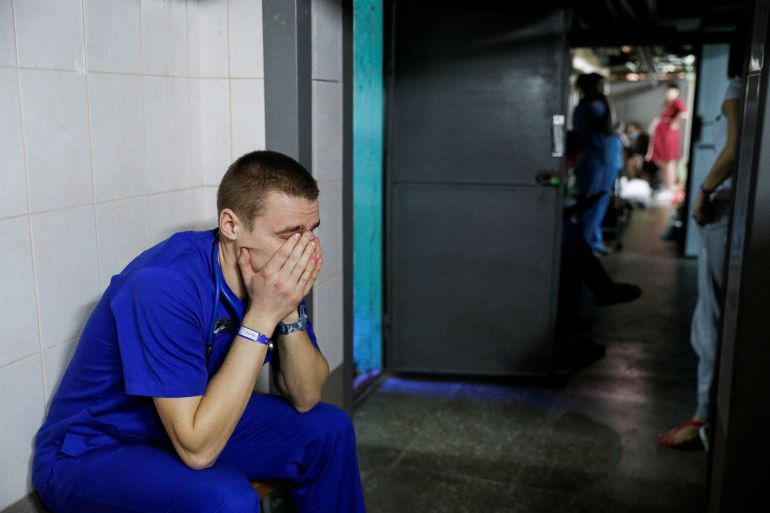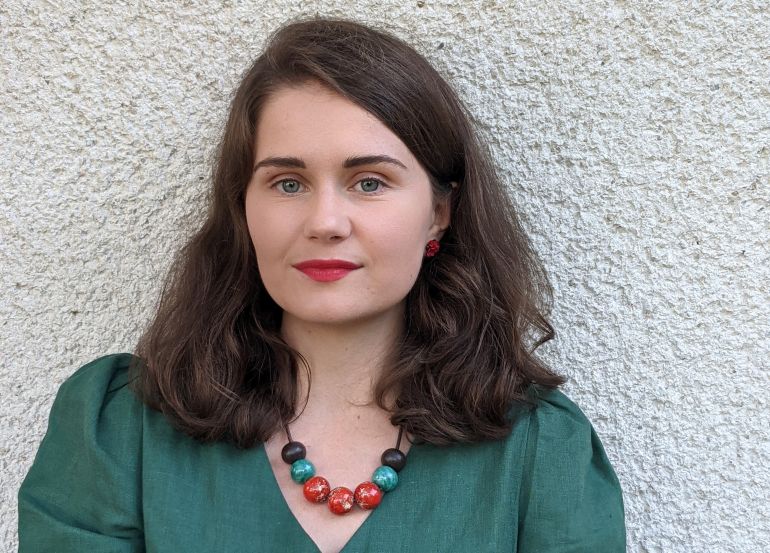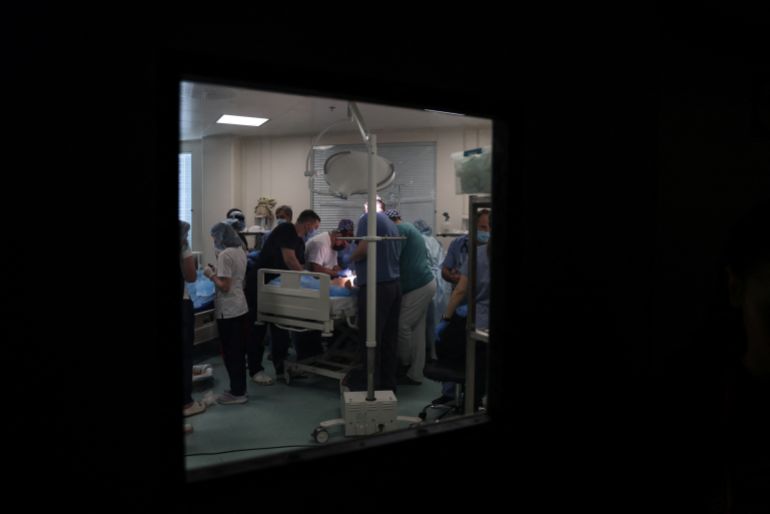‘Not alone’: Canadian doctors help train Ukrainian counterparts
Training videos aim to help healthcare workers not specialised in trauma care carry out basic, life-saving procedures amid war.

Montreal, Canada – Darya Naumova says this would typically be the most stressful time in her burgeoning career. The fourth-year medical student at Canada’s McGill University is in the middle of residency interviews, but she says it pales in comparison to what her family is going through under Russian bombardment in their native Ukraine.
“Sometimes I call them, and I want to hear how they’re doing, but they’re in such a shock, they’re not able to talk and are not able to tell me what’s going on,” says Naumova, 28, about her loved ones in the country’s central and southern regions.
Keep reading
list of 3 itemsIs Russia committing war crimes by bombing hospitals in Ukraine?
Ukraine accuses Russia of hitting psychiatric hospital
“And at the same time, I feel incredible guilt. I’m here, I cannot help in person, I cannot help physically, I want to. This obviously is occupying 100 percent of my attention right now, but I’m also in Canada.”
Like millions of Ukrainians living outside the country, Naumova, who has lived in Canada since age 17, sprung into action to support her country after Russia launched an all-out invasion last month.
Online fundraisers, rallies and other events have been held to condemn the bloodshed and to demand international action to stop the war, which has forced more than 2.3 million people to flee the country and devastated Ukrainian cities and towns.

But Naumova and her colleagues also quickly seized on another way to contribute, combining their expertise in trauma patient care with existing connections to healthcare workers in Ukraine to produce medical training videos to help respond to urgent needs during the conflict.
“We have a trauma surgeon in Kyiv who has been working with us over the last three years. As soon as the war broke out, we’ve been in contact with him every day,” she told Al Jazeera. “These instructional videos are something … we identified as a common ground where we can help.”
‘They’re not alone’
The Centre for Global Surgery at Montreal’s McGill University Health Centre, where Naumova conducts research, has been offering trauma care training in Ukraine for over a decade. Dr Dan Deckelbaum, the centre’s co-director, said they first began that work in Donetsk, in eastern Ukraine, before expanding to Odesa, Kyiv and Lviv, among other cities.
When the current war broke out, Deckelbaum said he reached out to his Ukrainian healthcare colleagues, who asked if the centre could provide them with training videos to help provide basic – but potentially life-saving – care during the conflict.
So far, they have produced about a dozen instructional videos, each ranging from about four to eight minutes, and especially geared to medical professionals who are not necessarily surgeons.
That is crucial, Deckelbaum told Al Jazeera, because during an armed conflict “pretty much everybody is mobilised to provide care to injured victims.
“You can be a dermatologist, an internist, a cardiologist, and you may have not done this procedure ever or it’s been a very long time. But now, during the war, you’re called upon to actually perform these life-saving procedures,” he said.
![A woman walks outside a maternity hospital that was damaged by shelling in Mariupol [Evgeniy Maloletka/AP]](/wp-content/uploads/2022/03/AP22068826147079.jpg?quality=80&w=770&resize=770%2C513)
Produced by a team of healthcare workers in a simulated operating room at McGill’s Steinberg Centre for Simulation and Interactive Learning, the videos cover a range of issues, including how to put a tube into a patient’s chest to evacuate air or blood, Deckelbaum said.
They are then translated into Ukrainian and shared with healthcare workers in Ukraine directly. Naumova said a more centralised way to distribute the material is in the works.
“There is obviously the technical elements of the videos and the knowledge transfer that’s occurring, but it’s also very symbolic,” Deckelbaum said about the project, stressing his support for Ukrainian healthcare workers who “have exhibited tremendous resilience, strength and commitment” under dire conditions. “[It’s] showing that they’re not alone in this.”
International support
Doctors, nurses, and healthcare workers from around the world have expressed solidarity with their Ukrainian colleagues over the past two weeks, while also denouncing Russian attacks on critical infrastructure, such as hospitals.
World Health Organization (WHO) chief Tedros Adhanom Ghebreyesus said on Wednesday that 18 attacks on health facilities, health workers and ambulances had been verified in Ukraine, including 10 deaths and 16 injuries. “These attacks deprive whole communities of health care,” he said.
Ukrainian officials that same day said Russia bombed a children’s hospital and maternity ward in the southern port city of Mariupol, killing three people and injuring more than a dozen others. The attack drew worldwide condemnation and calls for accountability.
Russia has denied directly targeting civilians and civilian infrastructure in the war, but on Friday Ukraine also accused Russian forces of bombing a psychiatric hospital in the country’s east.

“These attacks on healthcare facilities, transport and healthcare professionals are profoundly shocking. It is unacceptable that innocent people, including children and pregnant women, have been targeted in this war,” Dr Pamela Cipriano, president of the International Council of Nurses, said in a statement on Thursday.
“We are also aware that crucial healthcare supplies, such as tourniquets and key drugs, are lacking, and that water and electricity cuts are putting patients at great risk. We have heard direct reports from nurses who are living in the basements of hospitals in order to provide 24/7 lifesaving care. It is sickening to learn that their lives are still at risk even in hospitals,” she said.
For Naumova, the Ukrainian medical student in Canada, international support is part of what keeps her going. The other part, she says, is the inspiration she draws from her parents and other family members, “braving through the invasion and the constant attacks”.
“[The way] I encourage myself and other people is there are many, many fronts to this war,” she told Al Jazeera, from soldiers fighting and building barricades on the front lines, to refugees forced to flee, to Ukrainians abroad providing financial or emotional support to their families and friends.
“We can’t win this war if we’re all sitting in the trenches, or we’re all sitting online,” she said. “It really is people doing what they do best and fighting their own front.”